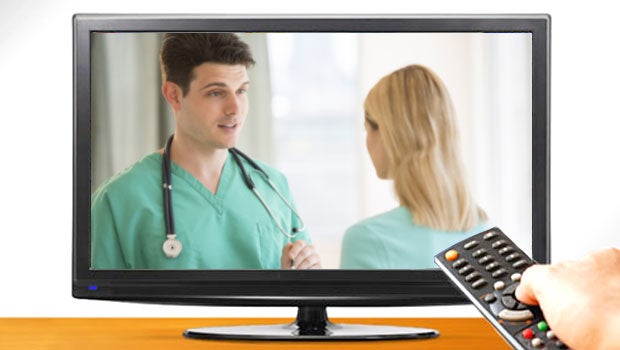
A light-hearted discourse on the issue of conflict of interest (COI), taking example from popular TV shows.
Two doctors were watching television together sharing a bag of chips on stage at Academia. One of them wearing a fluffy wig (“I lost a bet,” he said), the other donning an oversized name tag stating “Ethics Expert”. The set up may sound entertaining, but they were tackling a serious theme.
The two doctors on stage were Dr Anantham Devanand, Vice Chair of the National Medical Ethics Committee, and Dr Lalit Krishna, Chairman of the Clinical Ethics Committee at the National Cancer Centre Singapore (NCCS).
The reason they were on stage watching TV? A lunchtime discourse titled, “What can we learn about medical ethics from television?” during the Medical Academic Clinical Programme (MED ACP) week.
Scenes from the popular TV comedy “Scrubs” where the TV doctors fell for the tactics of a pretty and young pharmaceutical salesperson, as well as a satirical pharmaceutical commercial from the HBO show “Last Week Tonight”, which depicted the effects of pharmaceutical money and perks on doctors in a humorous light, were screened.
In 2012, a whopping US$15 billion was spent on just face-to-face sales and promotional activities by the pharmaceutical industry to engage medical professionals in the US.
Delving deeper, Dr Devanand and Dr Krishna took the light-hearted examples from the TV clips, and raised a common issue faced by the medical profession when it comes to interacting with the pharmaceutical industry: conflicts of interest.
Dr Devanand, who is a Senior Consultant at Singapore General Hospital’s Department of Respiratory & Critical Care Medicine, cited that in 2012, a whopping US$15 billion was spent on just face-to-face sales and promotional activities by the pharmaceutical industry to engage medical professionals in the US.
Many pharmaceutical companies continue to pursue their piece of the pie with major marketing campaigns as they face increasing competition from generic medicine manufacturers and other medicines offering the same function.
Sometimes, this can present a point of conflict when medical professionals buy into the marketing, instead of the effectivity of the drugs. In some countries, where “ask your doctor” is a common call-to-action at every turn – even information-savvy patients may take the bait.
Why does this matter? After all, our doctors surely manage their practice with dignity and conscience?
“We tend to underestimate our human-ness.”
Interestingly, a study has shown that marketing activities such as timely visits and corporate gifts to clinics, product placements on mugs and pens, incentivised trips or invitation to talks – relationships, familiarity and frequency of exposure to a brand – are real factors that can affect a doctor’s decision on which drugs to prescribe.
Dr Devanand, playing the devil’s advocate, asked Dr Krishna, an NCCS Senior Consultant in Palliative Medicine, “Don’t you ever fall for these?” Dr Krishna was quick to deadpan that the palliative circles do not get much attention or perks.
But he continued to outline how a salesperson being present at the right time to offer perks or lend their ears after a long and challenging day can subtly influence even the most rational doctor.
The doctors agreed: “We tend to underestimate our human-ness.”
Dr Krishna then drew the audience’s attention to the SMC Physician’s pledge, and said, “I believe we all remember the pledge we took, that we will make the health of our patients our first consideration."
“We have a fiduciary duty towards the patient’s welfare. We have to consider all the wider consequences of our unique position as trusted professionals with responsibility for our patients’ health.”
He added that healthcare professionals can do their due diligence to keep themselves objective, for example, by avoiding meeting pharmaceutical salespersons face-to-face, and only accepting “gifts” in the form of medical journals and articles.
The doctors closed the session with a clear stand: Such conflicts of interest are more abstract to navigate than we would like to think, and are not a threat if one understands clearly that being a doctor means becoming a trustee for our patients’ medical welfare.
The talk was part of MED ACP Week, 25-29 July 2016. MED ACP is celebrating their fifth anniversary this year.
Sponsorships? Yes, but… Health product companies often offer medical professionals sponsorships to attend conferences or courses overseas. This provides great opportunities for our clinicians to expand their knowledge. However, it may create a conflict of interest when it comes to prescribing or procuring a company’s products. In SingHealth, there are rules* that help guide institutions in dealing with such sponsorships, such as:
*Full policy available from the SingHealth Pharmacy and Therapeutics Council Office. The Council works on harmonising policies and procedures relating to the prescribing, dispensing and administration of drugs and other therapeutic products across SingHealth institutions. |













 Get it on Google Play
Get it on Google Play